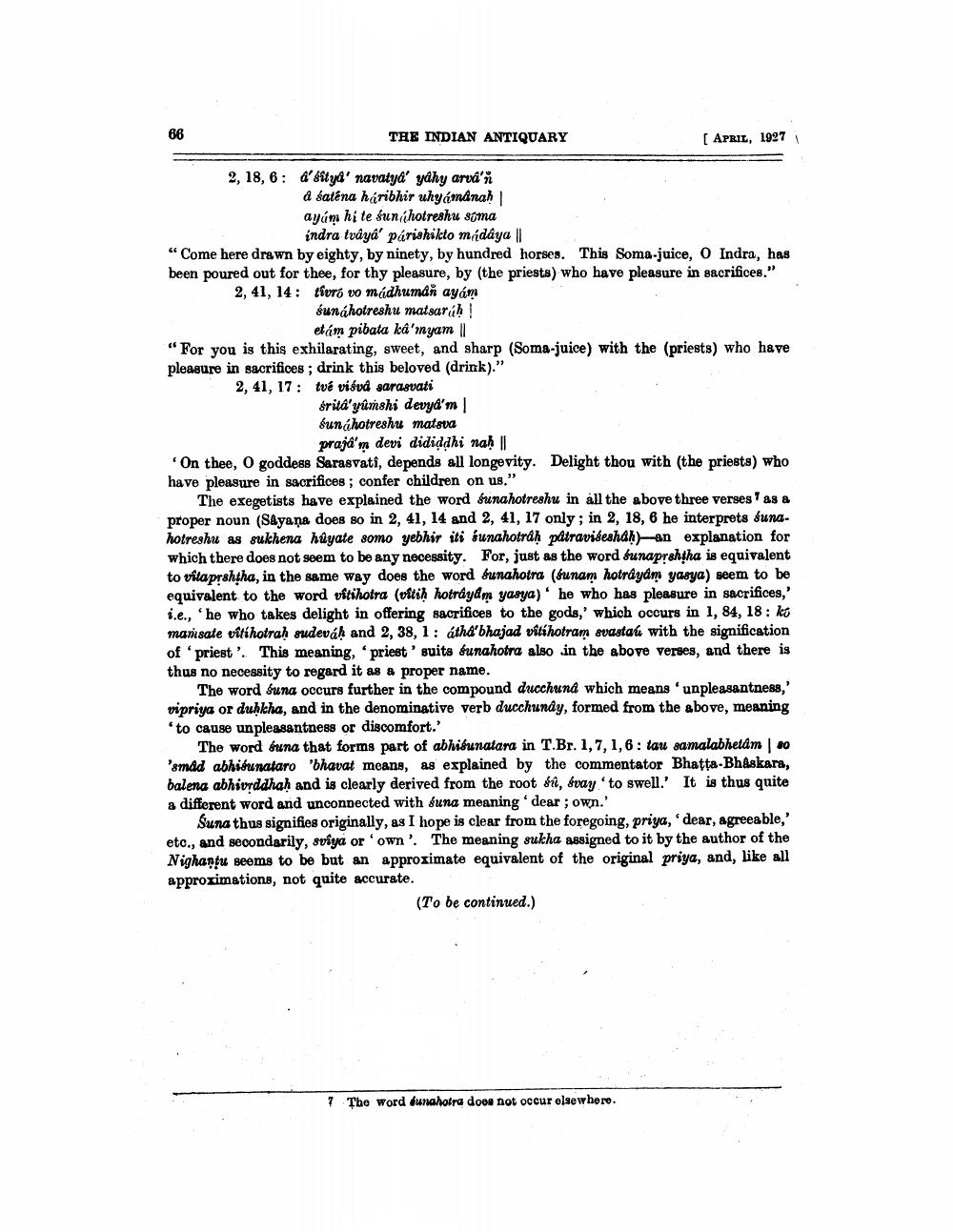________________
66
THE INDIAN ANTIQUARY
[APRIL, 1927
2, 18, 6: d'éity' navatya' yahy arva'n a saténa háribhir uhyamânaḥ | ayám hi te sunáhotreshu soma
indra tvâya' párishikto midâya ||
"Come here drawn by eighty, by ninety, by hundred horses. This Soma-juice, O Indra, has been poured out for thee, for thy pleasure, by (the priests) who have pleasure in sacrifices." 2, 41, 14: tiró vo mádhumán ayam sunáhotreshu matsarúḥ etám pibata kâ'myam ||
"For you is this exhilarating, sweet, and sharp (Soma-juice) with the (priests) who have pleasure in sacrifices;
drink this beloved (drink)." 2, 41, 17: tvé víóvá sarasvati érita' yumshi devya'm sunáhotreshu matsva praja'm devi dididdhi naḥ ||
'On thee, O goddess Sarasvati, depends all longevity. Delight thou with (the priests) who have pleasure in sacrifices; confer children on us."
The exegetists have explained the word sunahotreshu in all the above three verses' as a proper noun (Sayana does so in 2, 41, 14 and 2, 41, 17 only; in 2, 18, 6 he interprets sunahotreshu as sukhena huyate somo yebhir iti sunahotráḥ pátraviseshaḥ) an explanation for which there does not seem to be any necessity. For, just as the word sunapṛshtha is equivalent to vitapṛshtha, in the same way does the word bunahotra (sunam hotrâyâm yasya) seem to be equivalent to the word vitihotra (vitiḥ hotrayam yasya) he who has pleasure in sacrifices,' i.e., he who takes delight in offering sacrifices to the gods,' which occurs in 1, 84, 18: ko mamsate vitihotraḥ sudeváḥ and 2, 38, 1: átha bhajad vitíhotram svastaú with the signification of priest. This meaning, 'priest' suits bunahotra also in the above verses, and there is thus no necessity to regard it as a proper name.
"
The word suna occurs further in the compound ducchund which means 'unpleasantness,' vipriya or duḥkha, and in the denominative verb ducchundy, formed from the above, meaning 'to cause unpleasantness or discomfort.'
The word buna that forms part of abhiéunatara in T.Br. 1, 7, 1, 6: tau samalabhetâm | so 'smad abhiéunataro 'bhavat means, as explained by the commentator Bhatta-Bhaskara, balena abhivṛddhaḥ and is clearly derived from the root si, svay to swell.' It is thus quite a different word and unconnected with suna meaning 'dear; own.'
Suna thus signifies originally, as I hope is clear from the foregoing, priya, ' dear, agreeable,' etc., and secondarily, sviya or 'own'. The meaning sukha assigned to it by the author of the Nighantu seems to be but an approximate equivalent of the original priya, and, like all approximations, not quite accurate.
(To be continued.)
7 The word unahotra does not occur elsewhere.




